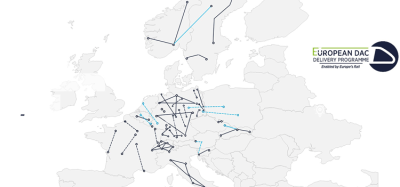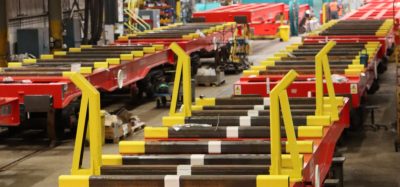SBB Cargo’s pioneering role is bringing benefits to customers
Posted: 30 July 2007 | | No comments yet
What do bananas, undressed timber and pasta all have in common? They are all travelling increasingly by rail thanks to the new rake offers added to SBB Cargo’s international wagonload services.
What do bananas, undressed timber and pasta all have in common? They are all travelling increasingly by rail thanks to the new rake offers added to SBB Cargo's international wagonload services.
What do bananas, undressed timber and pasta all have in common? They are all travelling increasingly by rail thanks to the new rake offers added to SBB Cargo’s international wagonload services.
Over the past few years, the North-South corridor between Germany and Italy has developed into a showpiece for the liberalised railfreight market. Rail traffic between the major North Sea ports, the industrial regions of Germany, Switzerland and the economic centres of northern Italy has become brisk, bringing much-needed relief to the region’s overloaded roads. And this boom is due in no small part to Switzerland’s railfreight operator. SBB Cargo is constantly expanding its offering in its northern and southern neighbours, and is thus continuously increasing its traffic volumes all along this important North-South corridor.
Performance figures 2006: continuous growth
As in previous years, SBB Cargo once again succeeded in massively expanding its traffic volumes in 2006. For the first time in its history, the railfreight provider posted volumes of more than 12 billion net tonne-kilometres. This represents an increase of 7.5% over the previous year’s performance (11.84 billion). The company’s German and Italian subsidiaries, in particular, enjoyed buoyant growth: SBB Cargo Deutschland ran services over a total of 2,304 million net tonne-kilometres in 2005, and in 2006 this figure grew to 2,983 million net tonne-kilometres – an increase of 29.5%. Overall, by mid-2006, the company’s German arm was operating 435 trains a week (2005: 360 trains). In Italy, the company expanded its volumes by 16.8%, from 608 million net tonne-kilometres in 2005 to 710 million in 2006. By mid 2007, SBB Cargo Italia was running 405 trains a week (2005: 260 trains). Last year, for the first time, 30% of SBB Cargo’s total carryings were outside Switzerland.
Thanks to the new range of services for wagon-load traffic, which have been available since spring 2006 between around a dozen transhipment and production platforms in Germany and Italy, customers with small and medium-sized freight volumes are also increasingly reaping the benefits of single-source handling of international traffic flows.
Undressed timber for Germany
Satis Italsempione is one of those customers. The company was founded in 1955 as a customs clearance agency based on the border between Italy and Switzerland. However, as liberalisation of the EU market progressed, Satis IS gradually started to handle railfreight services on behalf of European timber dealers and customers in the early 1980s. The opening-up of Europe’s rail networks proved advantageous to the company. “Today, the Germany/Switzerland/Italy corridor is the place to be”, says Gianfranco Martini, Managing Director of Satis IS. At the end of 2003, the company was the first customer to accompany SBB Cargo on its maiden voyage from Switzerland to Italy, since when it has been able to expand its operations at virtually the same pace as its railfreight provider.
Satis IS uses several of SBB Cargo’s new transhipment platforms. The company has been shipping undressed Swiss timber for a paper factory near Mannheim via the Worms platform since April 2006, and volumes now stand at 200 tonnes per week. Soon, a similar southbound service – to Fossano in Piedmont – capable of 400 tonnes per week will be established. Strategists at Satis IS also see a major role for the SBB Cargo transhipment platform in Weil am Rhein. The company wants to revive the services that once ran from France and Belgium to Italy but were suspended some years ago due to profitability factors.
Bananas from Bremerhaven to Switzerland
Migros is the only Swiss retailer to have its bananas brought from Bremerhaven to Switzerland by train. As the firm is SBB Cargo’s largest source of domestic sales revenues, this arrangement also represents a commitment to using the rail infrastructure for cross-border services, while for SBB Cargo it is a further step in the implementation of its North-South strategy.
Every week, two trains loaded with Chiquita bananas leave the North Sea port of Bremerhaven and head south. The bananas come from Central America and are still unripe when they reach Germany. Every Monday and Wednesday, SBB Cargo delivers them to the banana ripening facilities at six Migros cooperatives in Switzerland. Every year, SBB Cargo brings 20,000 tonnes of Chiquita bananas into Switzerland for Migros.
Bananas are a sensitive cargo, as their core temperature must be kept constantly within a range of 13.6 and 16 degrees Celsius. Otherwise they freeze, or begin to ripen too soon, and the consignment becomes worthless. This presents a major challenge for the entire logistics chain. SBB Cargo uses modern wagons equipped with refrigeration/heating units and ensures fast transit times: less than 24 hours after loading in Bremerhaven, the bananas are in Basel and ready to be distributed to the Migros cooperatives. For the German leg of the journey from Cologne onwards, SBB Cargo uses its existing platform train, which runs nightly between Duisburg and northern Italy.
Newsped puts its money on SBB Cargo
Another customer making intensive use of SBB Cargo’s new transhipment platforms is forwarding agency Newsped Transport & Logistics SA from Chiasso, on the border between Switzerland and Italy. Newsped’s operational rail transport hub is provided by the Magazzini Desio Brianza (MDB), also known as the Centro Logistico Integrato Milano Nord. This 95,000 square metre complex is one of Lombardy’s key road-rail interfaces. Just under two-thirds of its total area is covered and it has a direct connection to the international Milan-Chiasso main line and onwards to the north.
Among other MDB services, Newsped uses 500 square metres of this site for interim storage of Italian export loads arriving by truck before they are taken onwards into Switzerland by SBB Cargo. The freight consists primarily of consumer goods and foodstuffs, notably tomato puree, pasta and olive oil, but also mineral water, wine and spirits. On average, Newsped transports 60 to 70 wagons containing 3,000 tonnes of freight a month to and from Desio with SBB Cargo. In the medium term, the company intends to expand its northerly operations with SBB Cargo to Germany, with particular focus on the areas around Mannheim and Frankfurt.
Newsped also runs similar services heading from north to south. Every month, for example, SBB Cargo conveys around 400 tonnes of glass sand from the Benelux countries to Desio on its behalf. From there, the sand is distributed to a number of Italian (mainly Tuscan) crystal manufacturers by truck. Newsped also handles timber imports from the EU region. This business is run by Como-based Italian firm D.W.H. s.r.l., which Newsped acquired in May 2002. D.W.H. uses foreign rail companies to bring 50,000 tonnes of wood from Belgium, up to 60,000 tonnes from France and 10,000 tonnes from Eastern Europe into the country every year. Undressed timber makes up 80% of these imports; the rest is sawn timber.
Promoting rail siding services
The Swiss firm wants to gain an even stronger foothold in northern Italy in the near future, and not only via its platform system, but also by offering delivery of rail wagons to private-owner sidings by local feeder trains. Initially, this service is offered in the Turin and Brescia areas. SBB Cargo runs these trains itself; in other words, using its own shunter teams and diesel locomotives. The idea behind using diesel motive power is to ensure that even customers lacking access to electrified tracks will be able to take advantage of the service. While this delivery and pickup service is still in its infancy in Italy, north of the Alps it is the order of the day. Some of the German steel industry’s manufacturing plants even produce “direct onto the train”, thus cutting out the need for interim storage or additional handling.
Two cultures, one railway
“Our goal is to transfer even more goods from the road to the railway”, says my Italian colleague Marco Terranova, who heads SBB Cargo Italia. To this end he is relying on Swiss railways’ reputation, which, he openly admits, is certainly opening many doors for SBB Cargo Italia. Mr. Terranova went on the discuss that many customers are extremely keen to get on board and that the name of the game now is to move the necessary resources into place with the greatest possible dispatch. The decisive factor for potential railfreight users is the certainty that their freight will arrive quickly and reliably at its destination, thus maximising their capacity to plan ahead. Of course, the price of the service also plays a role; the rail option cannot end up costing them more than transportation by road. “What we want”, says Marco Terranova, “is a high-quality rail infrastructure based on the Swiss model but adapted to fit the Italian way of doing business. Bringing together these two cultures and getting the best out of both is something I regard as an absolutely fascinating challenge”.
About the author
Annette Jordan has been Head of SBB Cargo Deutschland GmbH since 2004. Prior to this, the 39-year-old German, who has a degree in mechanical engineering, held various positions at DB Cargo AG, including the post of Head of a major freight station in Germany.







